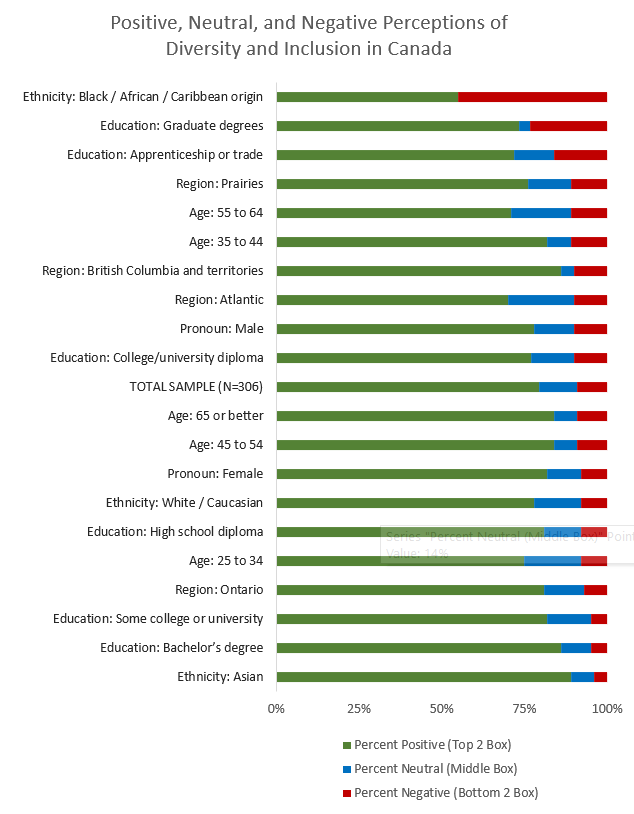Market research hinges on gathering data from a sample population that must represent a diverse audience. When a sample is not representative, it can lead to incorrect results and has ethical consequences. For the past 40+ years, we have ensured diversity in our studies to reflect the views of our community. We operate one of Canada’s largest online proprietary panels, comprised of more than ~300,000 unique people. We have developed strategies to attract and retain diverse panelists to build true audience understanding for our clients. As researchers, we are responsible for reflecting the aspirations of a more diverse and inclusive society.
At Canadian Viewpoint, we’ve had many conversations around diversity and inclusion. We’ve strengthened our long-standing commitment to making our company more inclusive. 43% of our leadership team and 55.8% of our entire team is made up of women. 57% of our team members are visible minorities compared to 52% of people in Toronto. We pride ourselves on genuinely having open conversations around diversity, racism, and ways to promote a more inclusive environment for everyone.
In honour of Black History Month, we asked Lisa E. Wright, Vice President, Strategy & Business Development, Wahib Ali, Vice President, Client Service, Daryl Shadrack, Project Manager, and Jasmin Eltaib, Project Coordinator at Canadian Viewpoint to share what this month means to them and reflect on their experiences in the market research industry, as well as what steps everyone can take to make the workplace more equitable for all.
What does Black History Month mean to you?
Lisa: Black History Month is about our ancestors, those who fought to make significant changes throughout history to better the lives of the black diaspora. Most people vaguely know these names, they are unheard of and forgotten, and for many of these warriors, the fruits of their labour were never seen or appreciated, and we owe many of our freedoms to their efforts. Black History Month is also an opportunity to proudly shine a light on Canadian Black historical figures, such as Elijah McCoy, Mary Ann Shadd, Harry Jerome, Rev. Addie Aylestock and Lincoln Alexander. I would encourage us to recognize our past, evaluate our present, and plan for our future. For more information on Canadian Black Historical Figures, click this link https://www.huffpost.com/entry/black-canadians_n_6108750fe4b0497e6702759c
Wahib: Black History Month is a celebration of Blackness. We celebrate the past, present and it reminds us of hope and opportunity for the future. As we still face many injustices as a community, it’s time to reflect.
Daryl: Black History Month is an opportunity for us to reflect on our heritage and take pride in the struggle of the Black community. In addition, it serves as an opportunity to recognize and celebrate the achievements of black people and remind our children of how far we have come and the important work that lies ahead.
Jasmin: To me, this month is a reminder to acknowledge and celebrate the stories of Black people and see how far we’ve come. Additionally, learning from our past allows us to pave the way for newer racial justice movements, such as Stop-Asian Hate and the fight for Indigenous Rights.
What steps can everyone take to make the workplace more equitable for all?
Lisa: It all starts with education, get into our colleges and universities, and offer internships for Black students. Then, look to create a diverse workforce by collaborating with Black community leaders to further your pool of potential hires.
Wahib: Educate yourself! Learn about racism, privilege, systemic racism, and conscious or unconscious bias.
Daryl: I urge everyone to educate themselves and take action to build inclusive environments for all. We all need to uplift all voices in our community and treat everyone with respect. Leaders need to facilitate positive changes and make an environment where others are comfortable and welcome to speak up and call out biases.
Jasmin: Being receptive of discussions that deal with uncomfortable topics is the first step in allowing others to feel safe to voice their own experiences. Often, people are silenced because they feel unsupported.
Reflect on your experience in the market research industry – what needs to be changed?
Lisa: Visibility! Nobody I know ever said,” I want to work in market research.” Most of us happened upon the industry. People who look like me need to be out in high schools, colleges and universities speaking about our industry, the different disciplines, careers, and employment opportunities. I am sick of hearing “we are an equal opportunity employer” this should be automatic. Wage gaps need to be closed. As it relates to market research studies, researchers need to push clients to include BIPOC and LGBTQ2s+ in their data sets.
Wahib: The George Floyd protests of 2020 started having a profound effect around the world. It was an awakening for many people to strive to do better. This was especially made clear with many companies/businesses starting diversity initiatives. But we need to be consistent. Not just in February, but every day. It is interesting to still see a few Black executives within the industry. I am hopeful that these initiatives will lead to more black representation within management and executive teams.
Daryl: I started working in the MR industry in the late ’80s, and I was probably one of the few at the table who looked like me. However, throughout the years, I have noticed more changes in the industry. Now I see more diverse teams and leaders who are paving an inclusive path in their companies and our industry. However, it’s not enough to only have D&I policies in the workplace. We need to continue building a culture where everyone continues to feel valued and heard.
What is your advice for the younger generation?
Lisa: Persevere, never give up! It is only over if you are dead. Take advantage of our education system, learn an unfamiliar word a day, DO NOT limit yourself. Adopt traits from a respected leader.
Wahib: Black history month is a conversation starter and not limited to just in February. To the younger black generation, continue to break down those barriers. There is a growing awareness of racism itself. Racism is being discussed in a way that has not been for decades. Seize this opportunity to highlight our strength, resilience, and cultures.
Daryl: Keep striving for success in all you do. Apply yourself to your fullest over and over again. Keep reaching for the stars.
Yasmin: I would tell the younger generation; if they want to work in an inclusive and equitable workplace, they need to build it by being a supportive ally.
We aspire to work in an industry that reflects the world we live in. Contact us about this article.




